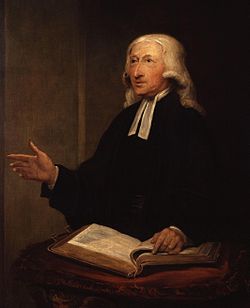 |
| John Wesley, by William Hamilton |
John Wesley was a famous preacher and prolific writer who often sought to make abstract doctrine or obscure Scripture relevant to the everyday lives of the people with whom he ministered. Although a number of sayings attributed to him today are disputed or can be shown to be false, many of them may still be considered true to his teachings. One of those that rings true because it is linked with the General Rules of the United Societies, is this "rule of life":
Do all the good you can,Wesley believed in making the best use of every moment and resource available to us: "Never be triflingly employed" was one of the maxims of his moral code, reflecting his desire to serve God faithfully in every endeavor. In case it's not clear what kind of "good" you're supposed to do, Wesley preached repeatedly on love as the central Christian virtue. In "The Character of a Methodist," as Steve Manskar explains, Wesley describes that
by all the means you can,
in all the ways you can,
in all the places you can,
at all the times you can,
to all the people you can,
as long as ever you can.
[t]he mark of a Methodist is his or her love for God. Their devotion to God is complete. Methodists center their lives upon God who became one of us in Jesus of Nazareth. His life and teachings provide the way Methodists live their love for God in all aspects of life. No part of life is untouched by their devotion to God and the things of God. This means that the Methodist’s love for God compels him or her to love those whom God loves. Their daily life is shaped by obedience to the teachings of Jesus.Manskar, who serves as the Director of Wesleyan Leadership for the General Board of Discipleship, continues,
Methodism is designed to equip people to receive the gift of faith by practicing the discipline of love given in the person and teaching of Jesus Christ. The discipline of love sets them free to become fully the human beings God created them to be, in the image of Christ. The aim of Jesus’ life and teaching is equipping his disciples to participate in his mission in the world.Love God, love those whom God loves (that is, everyone), do all the good you can. Sounds like a pretty good summation of the way of Jesus to me. And a compelling case for taking part in campaigns to end suffering, provide healing, and offer abundant life as we are doing through Imagine No Malaria.
I especially like Manskar's focus that the discipline of love is as much for our own benefit as it is for the benefit of those who receive our loving acts. By loving others, by giving of ourselves, our gifts, our time, our energy, we are set free to become fully who God has created us to be, set free to be transformed more into the image of Christ. Jesus' mission in the world is not just for the sake of those who have less, those who are suffering, but it is liberating and transformative for all who participate in it, both as givers and as receivers - and if we do it well, I think we experience both sides of that equation in the same action.
So have you done all the good you can today? Consider joining us in doing good in Africa as we seek to end malaria deaths and bring healing in Jesus' name. You might find yourself set free in the process.
P.S. You can read more about John Wesley at the Wesley Center Online, the Wikipedia article, or you might try Wesley and the People Called Methodists, by Richard P. Heitzenrater, for a fuller account.
No comments:
Post a Comment